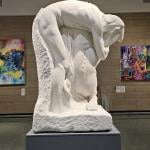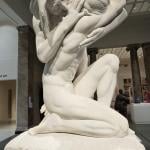 In the Critique of Pure Reason, Immanuel Kant claims that he had to deny knowledge to make room for faith through his critical philosophy. In this work, Kant sets out to challenge the metaphysicians who fail to critique pure reason and whose dogmatism he believes wars against morality (Immanuel Kant, Critique of Pure Reason, in Kant Selections, ed. Lewis White Beck, The Great Philosophers series {New York: Macmillan Publishing Company, 1988}, pp. 103-104).
In the Critique of Pure Reason, Immanuel Kant claims that he had to deny knowledge to make room for faith through his critical philosophy. In this work, Kant sets out to challenge the metaphysicians who fail to critique pure reason and whose dogmatism he believes wars against morality (Immanuel Kant, Critique of Pure Reason, in Kant Selections, ed. Lewis White Beck, The Great Philosophers series {New York: Macmillan Publishing Company, 1988}, pp. 103-104).
It is not any kind of faith that Kant champions, but moral faith, more specifically, moral faith as set forth within the limits of reason alone (see his discussion of religion in such works as Religion within the Limits of Reason Alone).
Whether or not one agrees with Kant, one cannot question the impact of his thought on modern thought and contemporary life. Even though many have jettisoned his rigorous rational engagement of morality and faith, they accept consciously or not certain tenets associated with his influence, namely, that we cannot know God theoretically as if God could be known like a scientific fact. Our minds are not wired to make such evaluations in the realm of empirical or scientific fact, as he sees it.
Again, whether or not one agrees with Kant, one cannot question his desire to affirm the realm of moral faith and with it freedom. Central to Kant’s philosophical enterprise were two fundamental concerns: affirmation of Newtonian science (the reigning account of physics in his day) and moral freedom. So central to his system of thought were the concerns for scientific fact (knowledge of appearances in the empirical sphere) and moral faith and freedom that his friends chose the following statement from the Critique of Practical Reason for his tombstone epitaph: “Two things fill the mind with ever new and increasing admiration and awe, the more often and steadily we reflect upon them: the starry heavens above me and the moral law within me.”
For our present purposes, I am most interested in Kant’s second claim—his fascination with the moral law within him. Bound up with this point, I believe, is Kant’s concern to guard against reducing humans to naturalistic accounts of identity. In other words, we must reject the reduction of our identities by way of mechanistic interpretations of reality. We are more than matter. We must guard against the exhaustion and equation of our persons with things. Moral freedom bound up with well-reasoned duty to universal rational norms reflects our uniqueness and suggests that no human should be reduced to a mere means to an end. We have enduring dignity—we are ends in ourselves.
Not everyone is taken with Kant’s account of reality. They maintain that he splits reality up into separate, disparate spheres, which never really meet. What do we make of such criticisms?
Putting aside that question for now, there are, as it were, two stories to the Kantian house in which we humans supposedly dwell—an upper story and a lower story. Faith and moral freedom dwell in the upper story and scientific fact dwells in the lower story. Where is the staircase that connects them? I believe, for Kant, the artistic genius is responsible for giving us a glimpse of the whole, of how things might be. Once again, we are not talking about fact in some hard science manner; rather, we are talking about hope.
Even so, what kind of hope does one find here? Will Kant’s account of reality—of the true, the good and the beautiful (his first, second and third critiques respectively)—suffice? Or are we left hanging, dangling between the two stories of his universe, holding onto a mere thread that keeps us from falling in despair? Are we really more than matter?












